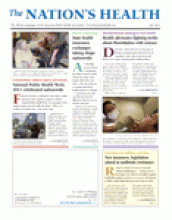Americans’ love affair with their cars is putting record numbers of miles on their odometers, but it might also be putting record numbers of pounds around their middles.
Suggesting that Americans’ expanding waistlines are linked to increased automobile usage, a new study from the University of Illinois presents a compelling argument for driving less and walking or cycling more. Published online in May in the journal Transport Policy, the study points to lower rates of automobile use in regions of the United States that exhibit lower levels of obesity.
In developing the study, researchers used the annual number of vehicle miles traveled per licensed driver in the United States as a measure of a person’s sedentary time. Analyzing data drawn from federal statistics between 1985 and 2007, the study links vehicle use with national annual obesity rates.
“You can think of obesity as an energy imbalance,” said lead study author Sheldon Jacobson, a professor of computer science and the director of the simulation and optimization laboratory at the University of Illinois. “People consume food, which is a form of energy, and then they expend it in their activities. But if you look over the last 60-plus years, the automobile has become our primary mode of transportation — so much so, in fact, we have literally designed our way of life around it. It is that energy imbalance that ultimately may lead to obesity.”
Jacobson noted that obesity rates in China and India are on the rise, especially as residents increasingly jump in their cars, rather than walk or cycle, to get around.
The study authors suggested that the results be taken with caution, but noted that their research is consistent with previous studies that suggest an association between automobile use and obesity.
“When you are sitting in a car, you are doing nothing, so your body is burning the least amount of energy possible,” Jacobson said. “And if you are eating food in your car, it becomes even worse.”
The study concluded that for the United States as a whole, given an adult population of about 230 million people, reducing daily vehicle travel by one mile per licensed driver would reduce the nation’s carbon footprint as well as reduce the nation’s waistline.
“If every licensed driver reduced their travel by one mile per day, in six years the adult obesity rate would be 2.16 percent lower,” Jacobson said. “In other words, almost 5 million fewer adults would be classified as obese based on the 2007 adult population.”
Previously, Jacobson studied the link between growing obesity trends in the United States and excessive fuel consumption.
For more information, visit http://www.elsevier.com/wps/find/journaldescription.cws_home/30473/description#description.
- Copyright The Nation’s Health, American Public Health Association









